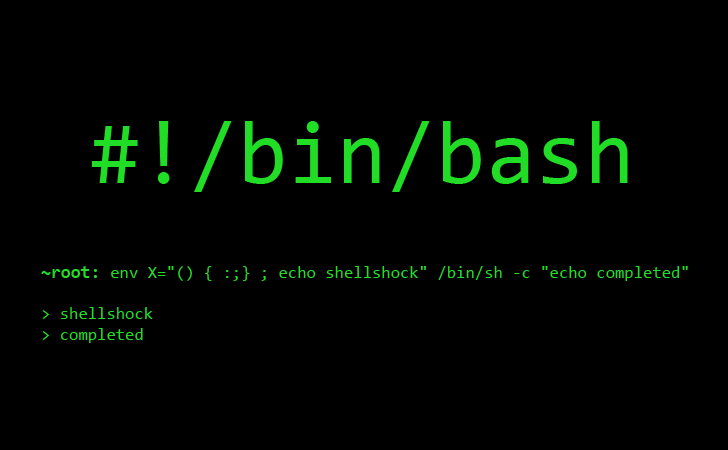The Bash Programming Tutorial: Compute the GCD (Greatest Common
- 时间:2020-09-18 17:26:09
- 分类:网络文摘
- 阅读:128 次

bash-shellshock
BASH script programming is powerful. However, the syntax is a lot different than the other modern programming languages e.g. C/C++, Java, Python, Javascript. Practice makes perfect: through coding exercises. This tutorial will present you a bash script that computes the GCD (Greatest Common Divisor) via the iterative approach.
The following is the BASH source code for computing the GCD between two integers.
1 2 3 4 5 6 7 8 9 10 11 12 13 14 15 16 17 18 19 20 21 22 23 24 25 26 27 28 29 30 31 32 33 34 35 36 37 38 | #!/bin/bash function max() { if [[ $1 > $2 ]] ; then return $1 else return $2 fi } function min() { if [[ $1 < $2 ]] ; then return $1 else return $2 fi } function gcd() { max $1 $2 local a=$? min $1 $2 local b=$? local t while [[ $b > 0 ]] ; do let t=a let a=b let b=t%b done return $a } if [[ "$1" =~ ^([0-9])+$ ]] && [[ "$2" =~ ^([0-9])+$ ]] ; then gcd $1 $2 echo $? else echo GCD Usage $0 integer1 integer2 fi |
#!/bin/bash
function max() {
if [[ $1 > $2 ]] ; then
return $1
else
return $2
fi
}
function min() {
if [[ $1 < $2 ]] ; then
return $1
else
return $2
fi
}
function gcd() {
max $1 $2
local a=$?
min $1 $2
local b=$?
local t
while [[ $b > 0 ]] ; do
let t=a
let a=b
let b=t%b
done
return $a
}
if [[ "$1" =~ ^([0-9])+$ ]] && [[ "$2" =~ ^([0-9])+$ ]] ; then
gcd $1 $2
echo $?
else
echo GCD Usage $0 integer1 integer2
fiTo run the script, save the above script using your favorite text editor e.g. vi/vim/emacs, as e.g. gcd then chmod +x gcd to grant your script executable permission. Then:
1 2 3 4 | $ gcd GCD Usage gcd integer1 integer2 $ gcd 21 28 7 |
$ gcd GCD Usage gcd integer1 integer2 $ gcd 21 28 7
Let’s take a look at the above bash script. The command line parameters can be referenced using the below syntax:
- $0 – the script filename itself in this case gcd
- $1 – the first command line parameter
- $2 – the second command line parameter
The BASH supports regex pattern testing via double square brackets and the =~ syntax. For example, the following code snippet test if the input is an integer:
1 | [[ "$1" =~ ^([0-9])+$ ]] |
[[ "$1" =~ ^([0-9])+$ ]]
And we can use the && to do the logical AND operator on two conditions (the two numbers need to be positive integers):
1 | [[ "$1" =~ ^([0-9])+$ ]] && [[ "$2" =~ ^([0-9])+$ ]] |
[[ "$1" =~ ^([0-9])+$ ]] && [[ "$2" =~ ^([0-9])+$ ]]
To invoke a function in BASH, we can use the following syntax:
1 | function_name parameter1 parameter2 ... |
function_name parameter1 parameter2 ...
For example:
1 | gcd 21 27 |
gcd 21 27
And the return value of the function can be accessed immediately after the function call, via the syntax/variable “$?”
Inside the function, you can access the parameters passed in using $1, $2, $3 .. for the first, second and the third parameter respectively and so on. The return value can be returned via the return statement in BASH. And the local variables need to be declared with keyword local. For example:
1 2 3 4 5 6 7 8 9 | function test() { local myvar = $1 return $1 } # Pass a string "Hello" to the function test. test "Hello" # prints Hello echo $? |
function test() {
local myvar = $1
return $1
}
# Pass a string "Hello" to the function test.
test "Hello"
# prints Hello
echo $?The let is a BASH inbuilt keyword that evaluates the arithmetic expressions, similar to double parentheses:
1 2 | (( expr )) let expr |
(( expr )) let expr
And finally, this is the GCD implementation using BASH programming:
1 2 3 4 5 6 7 8 9 10 11 12 13 | function gcd() { max $1 $2 local a=$? min $1 $2 local b=$? local t while [[ $b > 0 ]] ; do let t=a let a=b let b=t%b done return $a } |
function gcd() {
max $1 $2
local a=$?
min $1 $2
local b=$?
local t
while [[ $b > 0 ]] ; do
let t=a
let a=b
let b=t%b
done
return $a
}–EOF (The Ultimate Computing & Technology Blog) —
推荐阅读:石头的体积 梅文鼎与抽屉原理 人体上的尺子 一道行程问题 一道关于比的应用题 画家达·芬奇与数学 a与b成反比例,b与c成反比例,a与c成什么比例? 如何计算玻璃瓶(啤酒瓶)的容积 齿轮齿数比的问题 哪些类型的网站不适合使用虚拟主机?
- 评论列表
-
- 添加评论